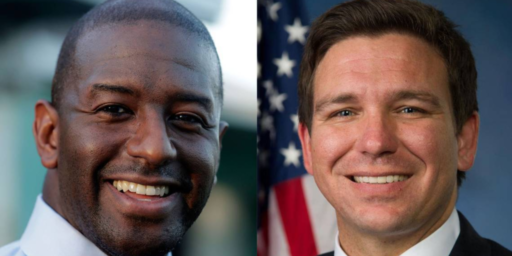Diversity Breeds Contempt
Harvard political scientist Robert Putnam, of Bowling Alone fame, finds that “immigration and ethnic diversity have a devastating short- and medium-term influence on the social capital, fabric of associations, trust, and neighborliness that create and sustain communities.” John Leo:
In the 41 sites Putnam studied in the U.S., he found that the more diverse the neighborhood, the less residents trust neighbors. This proved true in communities large and small, from big cities like Los Angeles, Chicago, Houston, and Boston to tiny Yakima, Washington, rural South Dakota, and the mountains of West Virginia. In diverse San Francisco and Los Angeles, about 30 percent of people say that they trust neighbors a lot. In ethnically homogeneous communities in the Dakotas, the figure is 70 percent to 80 percent.
Diversity does not produce “bad race relations,” Putnam says. Rather, people in diverse communities tend “to withdraw even from close friends, to expect the worst from their community and its leaders, to volunteer less, give less to charity and work on community projects less often, to register to vote less, to agitate for social reform more, but have less faith that they can actually make a difference, and to huddle unhappily in front of the television.” Putnam adds a crushing footnote: his findings “may underestimate the real effect of diversity on social withdrawal.”
[…]
Putnam’s study does make two positive points: in the long run, increased immigration and diversity are inevitable and desirable, and successful immigrant societies “dampen the negative effects of diversity” by constructing new identities. Social psychologists have long favored the optimistic hypothesis that contact between different ethnic and racial groups increases tolerance and social solidarity. For instance, white soldiers assigned to units with black soldiers after World War II were more relaxed about desegregation of the army than were soldiers in all-white units. But Putnam acknowledges that most empirical studies do not support the “contact hypothesis.” In general, they find that the more people are brought into contact with those of another race or ethnicity, the more they stick to their own, and the less they trust others. Putnam writes: “Across local areas in the United States, Australia, Sweden Canada and Britain, greater ethnic diversity is associated with lower social trust and, at least in some cases, lower investment in public goods.”
It stands to reason, really, that people are more likely to feel comfortable associating with people with similar experiences. Presumably, British and Canadian immigrants to the United States have an easier time assimilating than those from Mexico, let alone Ethiopia. Shared language and cultural norms make trust and social interaction easier.
It’s not just race and language, either. As a young Army officer stationed overseas, not only did I spend my off-duty time associating almost exclusively with other American officers, but mostly those from the South and Southwest, where I had grown up. This, despite never having really considered myself a “Southerner” up until that point, having moved around regularly as a soldier’s son.
In terms of politics and the provision of “public goods,” there is more likely to be sympathy for the plight of the poor if they are people one can relate to. If the underclass is disproportionately comprised of an easily identifiable “other” group, it’s much easier to resent “those people” for their failure to get with the program.
And, again, it’s not just about race or ethnicity. The reaction to a clean-cut fellow in a business suit telling you that he’s lost his wallet and needs $10 for cab fare will likely be quite different than a similar approach by an unkempt fellow who looks like he’s slept in the same clothes for a month.
Elsewhere, Daniel Larison wonders why Putnam’s conscience bothers him so: “if the evidence shows that the short to middle-term effects on all these things are indeed “devastating,” as Leo puts it, doesn’t a scientist or a scholar have the ethical obligation to report it and make it known as soon as possible?”
Further, he’s not sure the beneficial long-term effects are all that beneficial.
Human nature presents us with certain non-negotiable realities that we can either attempt to ignore at our peril or address promptly. In the end, Putnam’s findings purportedly show net benefits because “successful immigrant societies “dampen the negative effects of diversity” by constructing new identities,” but then this is precisely the problem the people with existing identities have with immigration. They know that immigrant societies construct new identities. This is why they oppose mass immigration itself, and not simply its excesses. This is not a consolation or a reason to become less concerned about the increase of diversity, but rather makes it all the more urgent to challenge and oppose the increase in diversity as much as possible.
Rod Dreher doesn’t think Putnam need worry, anyway:
I predict this research will have absolutely zero impact on the immigration debate. Why? Because Diversity is a dogmatic secular religion. To dissent from its dogmas is to declare oneself to be a heathen. Seriously, to question its premises is to be thought of as a closet hater by the Establishment. You would get about as far questioning Creationism at a backwoods Bible college as you would questioning Diversity at a US university, corporation or whatnot.
Steve Sailor, commenting months ago on an earlier leak of Putnam’s research, reflected on his own experiences trying to engage in community activism in Chicago.
This kind of Robert D. Putnam-endorsed good citizenship proved difficult in Uptown, however, precisely because of its remarkable diversity. The most obvious stumbling block was that it’s hard to talk neighbors into donating money or time if they don’t speak the same language as you. Then there’s the fundamental difficulty of making multiculturalism work—namely, multiple cultures. Getting Koreans, Russians, Mexicans, Nigerians, and Assyrians (Christian Iraqis) to agree on how to landscape a park is harder than fostering consensus among people who all grew up with the same mental picture of what a park should look like.
Indeed. We can’t cope with the very real social impact of immigration without acknowledging that it exists. Ultimately, absorbing people ambitious enough to leave their own societies to make a better life here is, I think, worth the short-term price. But we shouldn’t pretend there is no price.






I find this something of a headscratcher, James. On the one hand, there’s research that validates what most people think: we feel a greater sense of identify and affiliation (check the Latin roots of that word) with people to whom we have a genetic relationship e.g. our parents, our siblings, our cousins, our ethnic group. That’s a cross-cultural trait—it’s not unique to U. S. society.
But on the other hand the idea of affiliation to groups with whom we have little significantly less genetic relationship has changed significantly over time, at least it’s changed here in the United States. There was a time (and, in places, that time is within living memory) where white Anglo-Saxon Protestants (people of English, Dutch, Scandinavian descent and also some Germans) distinguished between themselves and, well, everybody else. They were “white”; nobody else was.
Slowly others have been allowed into the club: Scots, Irish, and, later, southern and eastern Europeans. Later yet Asians, and so on.
Is there a limit to diversity? I have no idea. I do agree that we’re more likely to be willing to offer a helping hand to “our own” than it is to a stranger. Who is our neighbor?
Not all of the change has been in a positive direction. 120 years ago the divide between rich and poor wasn’t nearly so high. In most cities rich and poor lived next door to each other or within blocks of each other. Now the distances between where the well-to-do live and everybody else lives can be quite great and I’ve seen at first hand people making distinctions based on presumed income (even when the ethnic group was their own) that I suspect might not have been made a century ago.
The study certainly tracks my experience. Dave’s comment was very smart, as well, and is a strong counter. The only thing I’d add is that assimilation into whiteness usually happens on the back of another, newer group. Hence the Jewish assimilation project excluding blacks, or Italians excluding Poles, etc. (there’s a lot of academic stuff on this topic, and it’s entirely possible I’m misrepresenting the argument or missing some subtleties)
Have you ever, ever been to California?
A few times. Is it your contention that English speaking immigrants are having more difficulty assimilating in California than their African and Mexican counterparts? Or merely that, given a huge non-assimilated Mexican population, new Mexican immigrants can blend in nicely?
I have to ask a fundamental question about this research. He is looking at neighborhoods that have already changed and contain many immigrants. So who is he sampling? One, the immigrants. Two, those who did not move out. I suspect the bulk of those that did not leave are the elderly and in particular the poor elderly. Frequently these will be those who are locked in because they own a home that has fallen in value so they can not sell it and buy a comparable home in a different community.
If my speculations are correct he is drawing very widespread conclusion from what appears to be a very biased sample. Now I have not read his research. So can anyone confirm or disprove my suspicions that he is sampling a very bias sample.
Well, not the Africans so much, but in general I can’t see Mexicans having a harder time of assimilation in California or Texas than, say, an Englishman who moves to rural Arkansas or South Florida.
Sure. But that’s precisely because there’s a large cohort of unassimilated Mexicans in those places! And I’d think a rural Englishman would be fine moving to the rural South; a Londoner, not so much.
Clearly partially true. But I would argue that a far more significant factor is the much larger cohort of assimilated Hispanics in those places.
I guess that, as a native New Yorker, my response to all this is “…whatever”.
Yeah. Negotiating diverse landscapes can be a challange. Problematical, perhaps. Also enriching. And far more interesting than living in a safe, boring monochrome.
Excuse the triteness, but as my granny used to say “diversity is the spice of life”.
OK, she actually said “variety is…”, but you get the point.
Tano, to whom did your granny give birthday presents: her grandchildren or the folks who ran the Chinese restaurant she got takeout from?
It’s not an irrelevant or facetious question. Experience suggests that it’s hard to maintain taxpayers’ interest in paying for the education of “their” children or paying for “their” healthcare. And it’s for exactly the same reason as (I suspect) that your granny gave her grandchildren presents on their birthdays rather than the folks at the Chinese takeaway.
I’m not saying we shouldn’t do these things. All I’m saying is that it’s easier to justify when they are us.
The fact that we are more comfortable with “our own” really isn’t all that shocking a finding–especially when it comes to things like language and culture.
But, the bottom line is that this is part of any migration of human beings. Despite the fact that I am a white male of protestant derivation who was born in, and lived the bulk of my life in, a former Confederate state, I had an extremely difficult time fitting into to life in a small, Alabama town. Indeed, so much so that my family and I moved to a larger city nearby after several years of trying to integrate.
And, of course, the definition of one’s “own” changes over time. There are lot of people I would prefer to hang out with/live with than some of my blood relatives. Heck, I have family in the central part of the state in which I now live with whom I have very, very little in common, despite the fact that my Mother spent much of her childhood among them.
Some places are more used to new comers than are others. I would argue that, in general, California, DC, Austin, NYC, Chicago, etc. are easier to assimilate into because the cultures are used to newcomers and are not based on the roots of their citizens and the long-term relationships between residents and their families.
Well Dave, its true that I got the presents, not the kids in the Chinese restaurant.
But nonetheless, I did grow up in an environment where it was just taken as a given that when we pay for education of the children, it means all children, even “them”.
Gee, I hope I am not slipping into some big-city elitist attitude by claiming that we were smart enough to understand that the Chinese kid was going to grow up someday and be a part of our society, so we had an interest in seeing them educated even if they were “strange”. While seemingly, folks from other parts of the country cant quite seem to make this calculation.
I guess it is a question of how you define “us”. Living in the most diverse place on earth, it is a bit hard to define “us” in a narrow manner. We may start out that way in the neighborhood, but you only have to walk a few blocks and meet the rest of the world. Seems inevitable that eventually you realize that “us” means “all of us”.